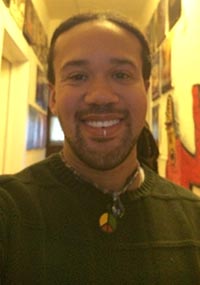 April 25, 2016
April 25, 2016
Written by: Aaron J. Evans, The Healing Center, Sexual Assault Counselor
The statistic that 1 in 6 men will be sexually abused as a child or adult is one that I have repeated over a thousand times during my work as a sexual assault counselor at The Healing Center. After hearing this statistic I’ve received a wide variety of responses from both male and female survivors, and the most common one from both males and females is “I had no idea it was that common.” As I continued in my work I quickly learned that the lack of knowledge about and understanding around this statistic has led to there being an extreme lack of services for male survivors and a lack of inclusion of them in academic literature, prevention work, and celebration of survivors. That is why I am so proud to not only be a male sexual assault counselor, but also an advocate for getting more services for male survivors.
One question I get asked a lot by friends, other therapists, and most importantly survivors looking to understand my presence at The Healing Center is “why did you chose to do THIS work.” My usual response to them is in a lot of ways this line of work chose me. I have friends who are survivors and watching their struggles with trying to cope with the aftermath of their assaults created a need to understand what they were going through and also to want to help them and others who have experienced similar pain. After I completed my undergraduate degree, I was looking for places to volunteer so I could gain experience and really begin to make a difference in the community. This is where I found the Sexual Assault Treatment Center (SATC) located at Aurora Sinai, got my first experience working with survivors, and was eventually introduced to The Healing Center while doing my practicum hours for my master’s degree. While interning at The Healing Center I began to truly understand the prevalence of sexual abuse and assault in our society and gain even more respect for the bravery of the survivors who walked through our doors. I also began to understand how many of the mental health issues we see in the field (anxiety, depression, substance abuse, etc.) are directly related to some form of trauma the individual has experienced in their life and that working on that trauma can have more of a profound effect on the individual than simply working on their anxiety or depression. After figuring this out I knew that I wanted to make sexual abuse work my area of expertise and decided that I would continue at The Healing Center as an extern as long as it took for me to get a staff position there. Luckily that didn’t take long and I was hired on as their first male staff member and immediately took on their men’s programming.
Being a male counselor in this field has come with its share of challenges. As a male in the space I don’t pretend to be oblivious to the fact that some of the women who come to The Healing Center are shocked and sometimes made uncomfortable by my presence. I have co-facilitated groups that have never had a male in them before and have received open criticism and had my motives for doing this work challenged by more than one female group member. One challenge that I did not expect was the number of male survivors who did not want a male counselor because they feared being judged due to the myths around male abuse and what it means about masculinity and sexuality. However, these barriers have been minor and I have been able to build a solid caseload of both male and female survivors of different ethnicities, ages, and sexual orientations who have been willing to lean into their discomfort and work with me.
If I could say one thing to survivors out there who are struggling, it would be that it can get better, and there is help out there for you. To male survivors in-particular I would say that the myths about male survivors are not true: you did not cause it, you did not deserve it, you ARE still a man, and being a survivor DOES NOT mean you will become a perpetrator yourself.
To allies of survivors I would say that there needs to be more recognition of males as survivors and not just as perpetrators in the fight to end sexual violence, more services need to be made available for men, and that service providers need to begin making their centers more inclusive and accessible to male survivors.
Finally to the families of survivors I would say that the most important thing to know is that you should believe someone when they tell you they’ve been assaulted is one of the biggest steps toward healing that you can give to a survivor. The final piece of advice for family members I’ve learned from working with survivors is that you should treat the survivor in the same way you would before you knew they were a survivor. Many survivors have reported that one of the things that get them upset about disclosing to family and friends is that afterwards they are pitied and looked at as fragile. Survivors work hard to move past their pain and take back their lives from their trauma and when they are looked at by others through the lens of a victim, it can make their journey that much more difficult. The Healing Center and other service providers have support groups and individual counseling for family members of survivors to get the support and education they need to help their loved ones through their journey. If you are at all serious about supporting a loved one who is a survivor my suggestion would be to seek them out and empower yourself to empower others.